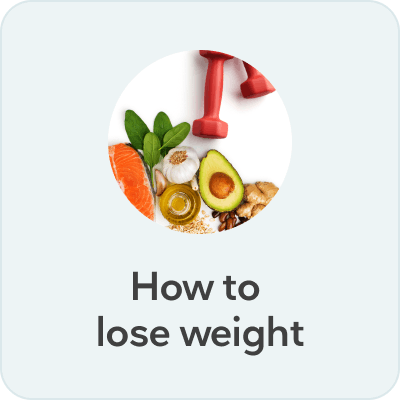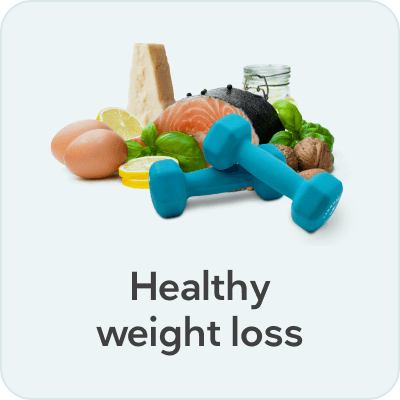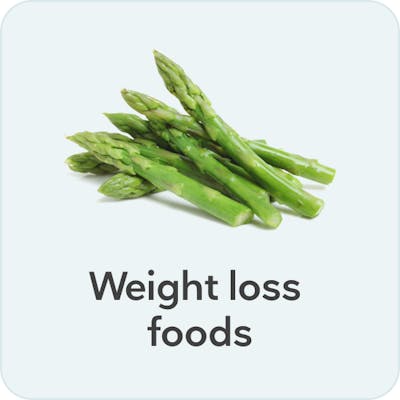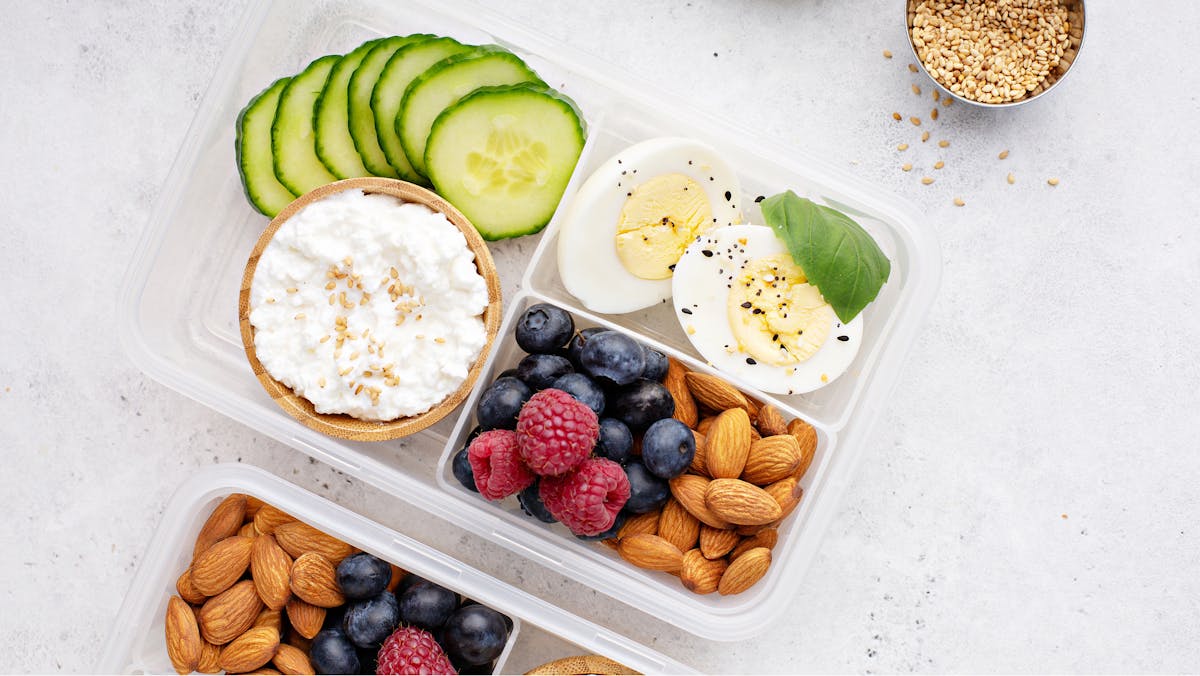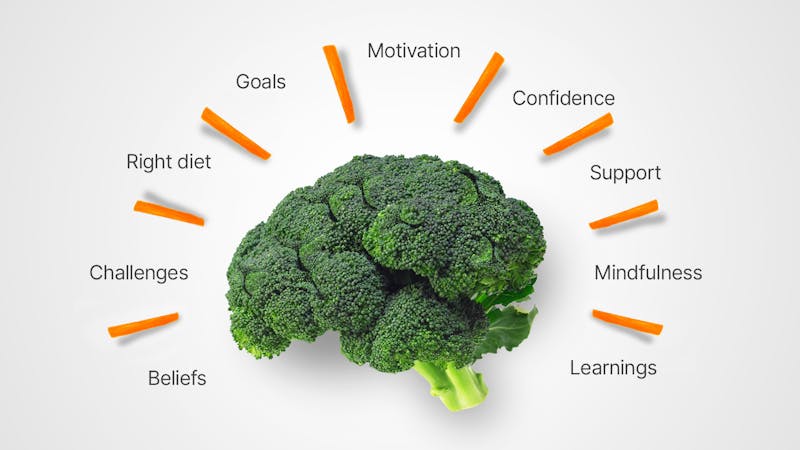15 tips for breaking a weight loss plateau
Evidence based
Key takeaways
Is it really a weight loss stall? If you haven’t lost weight for a few weeks, you may not be experiencing a true stall. Learn moreEat more protein and fiber, watch your carb and fat intake, and consider eating less frequently. Learn more
In addition to food, evaluate lifestyle factors. Stress, poor-quality sleep, and your mindset can also contribute to plateaus. Learn more
Have you hit a plateau in weight loss, where the number on your scale doesn’t budge even though you’re sticking to your diet? If so, you’re not alone. Weight loss stalls are common, but that doesn’t make them any less frustrating.
Fortunately, making some simple adjustments may help you begin to lose fat again. In this guide, we share 15 weight loss plateau breakers. You’ll likely only need to try a few of them, depending on the diet you follow and the reasons behind your stall.


Is it really a weight loss plateau?
First, it’s important to know whether what you’re experiencing is truly a weight loss plateau.
People lose weight at different rates depending on age, size, and other factors. Women typically tend to lose weight more slowly than men.1
But regardless of your age or gender, you’re likely to lose more weight during the first two weeks of a diet — especially a low carb diet — than you will in subsequent weeks. A portion of this early weight loss will be water rather than fat.2
Then, you’ll tend to lose more slowly — and less consistently — for the rest of your weight loss journey.3
Sustained weight loss frequently occurs in a non-linear fashion. So, it’s perfectly normal to lose two pounds (about a kilo) one week and then go several weeks without losing any weight before beginning to lose again.
If this is what you’re experiencing, you may not need to make any changes — as long as you’re happy with your diet, energy levels, and health markers, such as blood glucose and blood pressure.
A weight loss plateau, or stall, is different. It’s a period of at least two months without any weight loss.
Experts aren’t certain about what causes weight loss plateaus. Theories include that they occur because the body is defending itself against further weight loss by slowing down its metabolic rate, or because people are eating more calories than they need to continue losing weight.4
When does a weight loss plateau happen? Researchers who conducted a review of 80 trials found that plateaus occurred most often around the six-month mark on a weight loss diet.5 However, they can happen earlier or later, too, depending on the person.
Another consideration is that you may be losing body fat and gaining lean mass, which isn’t always reflected on the scale. Or, you may have already reached a healthy weight for you. We’ll explain more about this in tips 13 and 15.
If it’s been more than two months since you’ve lost any weight or body fat, read on for 15 specific weight loss plateau solutions.
15 ways to break a weight loss plateau
1. Include protein at every meal
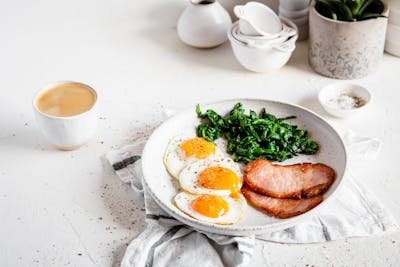


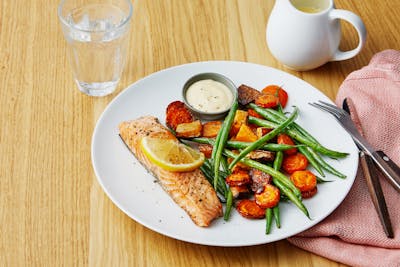





Eating protein-rich meals can boost weight loss in several ways.
First, your body burns more calories digesting protein compared to carbs or fat. Studies suggest that your metabolic rate increases by about 20 to 30% during protein digestion, 5 to 10% during carb digestion, and up to 3% during fat digestion.6
This means that when you include plenty of protein at every meal, you’ll burn more calories for several hours after eating. Plus, you may feel fuller and more satisfied while digesting your meal.7
Additionally, eating more protein may protect against reduction in resting metabolic rate and loss of muscle, which often occur during weight loss.89
Indeed, strong evidence demonstrates that higher-protein diets tend to help people feel full, lose weight, and maintain a faster metabolism.10
How much protein should you eat at meals? That depends on several factors, including your height, age, and activity level. You can use our minimum daily protein target chart to find out what your body needs.
As a general recommendation, aim for a minimum of 30 grams per meal if you’re a woman who eats three times a day and 35 grams if you’re a man who eats three times a day. If you only eat twice a day, make sure to eat more protein at both meals.
2. Eat foods that provide plenty of protein per calorie
Have you tried restricting yourself to very few calories to overcome a weight loss plateau? This can often be counterproductive because it leads to hunger. And it’s nearly impossible to ignore hunger pangs for long!
To begin losing weight again without feeling hungry or deprived, focus on foods that get a high percentage of their calories from protein.
A food’s protein percentage tells you how much of its calories, excluding fiber, come from protein.11 Foods with high protein percentages provide minimal calories with maximum satiety — that feeling of being comfortably full and satisfied.
Which foods provide a lot of protein per calorie? Dozens of animal and plant foods have high protein percentages.
Choose your favorites from the list below, or click on the links for detailed protein information for all types of protein foods.
High-protein foods
- Meat, seafood and eggs: Chicken, turkey, red meat, all types of fish and shellfish, and eggs
- Dairy products: Greek yogurt, cottage cheese, reduced-fat cheese, and whey protein
- Vegetables: Leafy greens, asparagus, mushrooms, cauliflower, green beans, and many more
- Plant-based proteins: Tofu, seitan, beans, and more
3. Consider cutting back on carbs
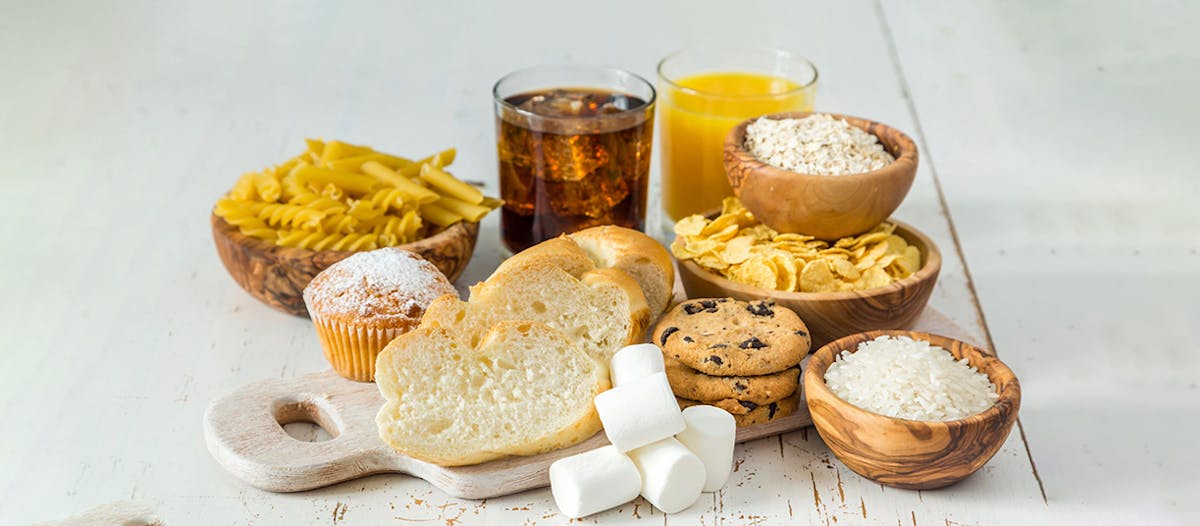

If you’re already following a keto or very low carb diet, feel free to skip to tip number 4.
However, if you follow another diet approach, reducing your carb intake might help you begin losing again.
Multiple studies have concluded that keto and low carb diets can be very effective for weight loss.12 At Diet Doctor, we define a keto diet as one that provides less than 20 grams of net carbs per day.13 We define a moderate low carb diet as one that provides 20 to 50 grams of net carbs daily.
But if the idea of a very low carb diet doesn’t sound appealing, you may be able to reverse your weight loss stall by simply reducing some of your carbs while maintaining your current diet approach.
For example, in some studies, Mediterranean diets providing roughly 70 to 120 grams of net carbs per day have been found to produce greater weight loss than traditional higher carb Mediterranean diets.14
You can get 70 to 120 grams of net carbs per day by eating mainly protein foods, low carb vegetables, and some fat, along with modest portions of fruit, starchy vegetables like beets and carrots, and perhaps some grains like rice and corn.
Whether you opt to follow a keto diet, a low carb diet, or simply cut back on carbs a bit, you may see your weight loss resume with a lower carb approach.
4. Assess your fat intake
Has your weight loss stalled after your great initial results on a keto or low carb diet? If you’ve been minimizing carbs but eating as much — or more — fat as you did when you first started losing weight, you may want to cut back on fat a bit.
Yes, butter, cream, and cheese contain very few carbs. However, they’re also delicious, high in calories — and can be easy to overconsume. Nuts are another keto-friendly, high-fat food that can be tough to stop eating.15
Even on a very low carb diet, eating more fat than your body needs can slow down weight loss.16
If you’d like to exclude dairy from your diet for a few days to see if you notice a difference, please see our 3-day dairy-free keto meal plan to help you get started. Each day provides less than 20 grams of net carbs per day, so that you can stay keto without the dairy.
So, don’t add large amounts of fat to your food. Also, avoid or limit your intake of butter (a.k.a “bulletproof”) coffee, fat bombs, and similar high-fat keto treats.
Importantly, this isn’t a recommendation to eat a low-fat diet, but simply to go easy on added fats and high-fat foods that provide little protein or satiety per calorie. You can continue to enjoy protein-containing foods that also contain fat — rib-eye steak, chicken with the skin on, fatty fish, etc.
Read our guide about how to eat more protein and less fat while staying keto or low carb.
5. Eat more high-fiber vegetables
Upping your non-starchy vegetable intake may be a winning strategy for breaking through a weight loss plateau.
Non-starchy vegetables are mainly the types that grow above ground: leafy greens, broccoli, cauliflower, and green beans, to name just a few. These vegetables are low in calories yet filling because they’re high in water and contain fiber, which can provide short-term satiety by stretching your stomach.17
Research demonstrates that in addition to making people feel full, fiber may help them eat less and absorb slightly fewer calories from the food they eat.18
The best vegetables for losing weight are low in carbs and provide plenty of protein per calorie. Include a generous serving of your favorite above-ground vegetables at most meals, along with a little fat to enhance their flavor.
6. Give intermittent fasting a try
Could skipping breakfast (or another meal) help you begin to lose weight again? It’s possible, especially if you like the idea of eating larger portions of food less frequently.
Intermittent fasting includes time-restricted eating (skipping one or two meals every day) and alternate-day fasting (eating normally one day and fasting or eating very few calories the next day). Simply put, intermittent fasting focuses on when you eat rather than what you eat.
Several reviews of clinical trials have found that intermittent fasting can be as effective — and possibly more effective — as chronic calorie restriction for losing weight and body fat.19
One of the advantages of intermittent fasting is that it can be combined with any way of eating.
So, if you like your current diet, you may want to try eating the same foods within a shorter “eating window” to see if this helps you break through your stall. Learn more in our guide to Intermittent fasting for beginners.

7. Drink water, coffee, or tea
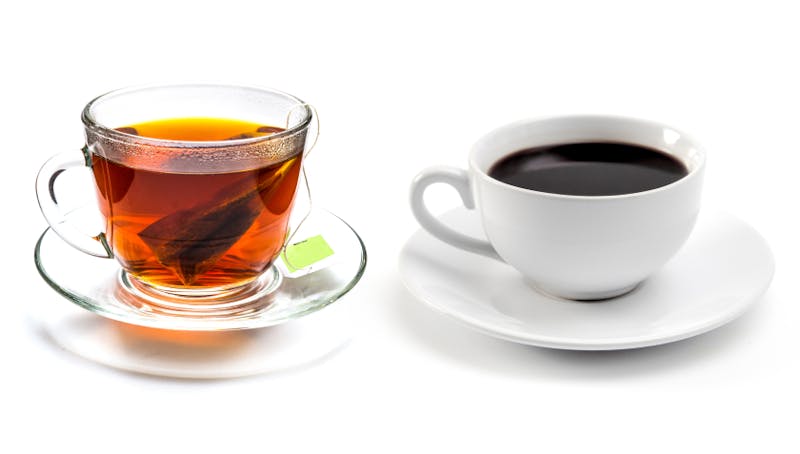

Your beverage choices can help or hinder your efforts to reverse a weight loss plateau.
Water is an excellent calorie-free thirst quencher whether it’s still or sparkling, iced or at room temperature. Plus, some studies suggest that drinking water may help you lose weight.20
Beverages like coffee and tea offer a bit of flavor and potential weight loss benefits because they contain caffeine, which may slightly boost calorie burning.21 You can learn more about this in our guide, The truth about fat-burning foods.
How much caffeine should you consume? It depends. Most people can drink one or two cups of coffee or tea daily without any issues. But if caffeine makes you feel jittery or interferes with your sleep, choose decaf coffee or herbal tea. If you find it tough to drink coffee or tea “black,” add a small amount of milk, cream, or low carb sweetener.
Skip the sports beverages, sugar-sweetened sodas, sweet coffee or tea drinks, and fruit juice — all of which are loaded with empty calories.
What about diet soft drinks? Some, but not all, studies suggest that replacing diet soda with water can be helpful for weight loss.22 While it’s probably OK to have an occasional diet soda, we recommend making water, coffee, and tea your go-to beverages.
8. Track what you eat
If your food and beverage choices have been on plan but your weight remains stable, tracking what you eat might be helpful.
Entering your food into an online food diary or app allows you to see your daily carb, protein, fat, and calorie intake — meal by meal, or as an overview for the entire day.
Data from several trials suggests that tracking your food intake may help you lose weight.23
Yes, logging your food intake can be time consuming. Additionally, it may take some of the pleasure out of eating naturally. On the other hand, if your weight loss has stalled, tracking what you eat may reveal potential issues that you may not be aware of. Plus, you may only need to do it for a short time.
Popular free tracking programs that you can access online or via a cell phone app include Cronometer and MyFitnessPal. Although the nutrition information for some of the foods listed in the databases may not be entirely accurate, the act of logging your daily food intake may help provide accountability and motivation.
9. Prioritize sleep


Getting plenty of high-quality sleep is vital for good health. By contrast, a lack of sleep can lead to health problems — and it might also slow down weight loss.
In short-term studies lasting anywhere from five days to three weeks, sleeping only 4 to 5.6 hours per night has been found to increase hunger and reduce metabolic rate, which can potentially promote weight gain over time.24
Fortunately, these studies also found that getting “recovery sleep” of 9 to 10 hours helped reverse the health effects of sleep deprivation. According to the sleep researchers, most adults should sleep between 7 and 9 hours nightly.25 And one study reported getting an extra hour of sleep, with no specific advice to change eating habits, lead to eating fewer calories and losing weight.26
If you have a hard time falling asleep or staying asleep, try practicing what sleep experts call healthy “sleep hygiene.” These are daily habits that may improve the quality and length of your sleep:27
- Have a sleep routine: Go to bed and get up at (or near) the same time every day, including weekends. Avoid looking at your computer, tablet, or cell phone an hour before going to bed. Read or engage in another relaxing activity until you feel tired.
- Prepare your bedroom for sleep: Make sure your room is cool and dark, and that your mattress, linens, and pillow are comfortable.
- Avoid caffeine and heavy food close to bedtime: Don’t drink caffeinated beverages after noon. Try to finish dinner at least three hours before going to bed.
- Get plenty of daylight and activity during the day: Aim for a daily minimum of 15 minutes of outside light exposure, engage in physical activity every day (though nothing strenuous close to bedtime), and avoid taking naps.
10. Reduce stress
While having a small amount of stress is normal, being under chronic, excessive stress is unhealthy. Additionally, it can impede weight loss in several ways.
First, a high-stress lifestyle may cause you to eat more than you need or to reach for so-called “comfort foods” that are high in carbs and fat — even if you’re not truly hungry.28
In addition, chronic stress can raise levels of the stress hormone cortisol which, when elevated, may promote increased fat storage — particularly around the middle — in some people.29
The good news is, several studies demonstrate that combining stress reduction techniques with healthy eating behaviors can be more effective for weight loss than making dietary changes alone.30
You can take action today to lower your stress levels, which may help you start losing weight again and — more importantly — improve your health and quality of life.
Here are a few suggestions:
- Begin meditating or practicing yoga: Strong science supports the benefits of meditation on stress, including anxiety and depression.31 Insight Timer and Headspace offer free guided meditations you can access from your tablet or cell phone. Besides traditional meditation or yoga, you can relax your mind in other ways. Try sitting or lying down in a quiet room and observing your breath for five minutes. Or take a brief walk down a non-busy street and pay attention to the sounds and sights around you.
- Phone or meet up with a friend: Even though talking about the source of your stress may not resolve it, sharing your concerns with a friend or family member may help some people feel calmer and supported.
- Focus on your reactions: Although you may have limited control over many stressors, you can control how you react to them. Work on saying “no” when you’re asked to do something but already have a lot on your plate. Or, for example, choose not to get overly upset when delayed in traffic or waiting in line for services.
11. Avoid alcoholic beverages
Although some diets allow dry wine and zero-carb alcoholic drinks, it’s best to avoid them if your weight loss has stalled
Drinking alcoholic beverages can slow down weight loss because your body burns alcohol before it burns carbs, protein, and fat — including body fat.32 Alcohol can also interfere with weight loss by increasing your appetite and decreasing your inhibitions. This may lead you to overeat — or make less-healthy food choices — without even realizing it.33 However, if you don’t want to give up alcohol altogether, it’s best to make low-carb alcohol choices, which only provide empty calories from alcohol — not from alcohol and sugar.
Remember, your best beverage choices for healthy weight loss are water, coffee, and tea. For a non-alcoholic, calorie-free cocktail, flavor your sparkling water with lemon or lime.
12. Ramp up your exercise routine


Studies suggest that physical activity generally plays a minor role in weight loss. What you eat seems to be much more important.34
However, engaging in exercise several times a week may help get your weight loss back on track.
Aerobic activity (such as walking or biking) and resistance training (such as lifting weights) can help you lose body fat, burn calories, and retain muscle during weight loss.35 In addition, resistance training can help you build muscle. Increasing your muscle mass means you’ll burn more calories while at rest.36
If you’re pressed for time, rapid bursts of more strenuous exercise, such as high-intensity interval training (HIIT), may help you burn more calories than other forms of exercise performed for the same duration.37
Try to lift weights, do push-ups, or perform other kinds of resistance exercise for 30 minutes a few times a week. Walk, run, dance, or do another aerobic activity you enjoy for 30 to 60 minutes on most days, if possible.
Read our comprehensive exercise guide to learn which types of exercise may be best for you.
One important thing to remember: If you’re building muscle while losing fat, you may not see any change on the scale even though your body composition is improving. A pound of muscle weighs the same as a pound of fat, but muscle is denser and takes up less space than fat.
The number on the scale can indeed be deceptive. More on that in number 13, below.
13. Don’t rely on the scale alone
We tend to measure our weight loss progress solely by the number on the scale. This seems reasonable, because the number is objective: either it’s lower than the last time you weighed yourself, or it isn’t.
Keep in mind that although following trends in your scale weight can be helpful, using the scale as your only barometer of success can cause unnecessary frustration.
Many factors can influence the day-to-day number on the scale when you weigh yourself, including:
- water retention due to hormonal fluctuations, eating foods high in carbs or sodium, or drinking alcohol
- whether your bladder is empty or full
- the amount of digested food in your intestinal tract
- changes in body composition related to exercise
First, make sure to weigh yourself properly. Get on the scale first thing in the morning, without clothing, before eating or drinking, and after using the toilet. Additionally, your scale should always be in the same place, on solid flooring rather than a carpet.
Next, instead of focusing only on the scale, evaluate your progress by:
- Measuring yourself. Use a tape measure to measure your waist, hips, legs, and arms once a month. Record your measurements in an app or notebook.
- Assessing how your clothes fit. Are they even slightly looser around the waist? If so, that may mean you’re losing fat, even if the number on the scale hasn’t changed.
- Looking at yourself in the mirror or in photos for signs of subtle changes in your face and body.
In short, don’t place so much importance on a single number.
14. Adopt a healthy weight loss mindset
Successfully breaking through a weight loss plateau may involve more than making food, exercise, and lifestyle changes. Sometimes, it may also take a shift in mindset.
Your thoughts and emotions can play a large role in losing weight.38 Changing the way you view your weight loss journey can:
- improve your motivation and commitment when your weight seems to have stabilized
- boost your confidence that you will begin losing again
- help you manage the stress and challenges that might cause you to give up
Developing a positive mindset can be key to achieving weight loss and improving your health. And it’s never too late to start.
Read our comprehensive guide 10 steps for a successful weight loss mindset for inspiration and to find out the action steps you can take right now.
15. Make sure your weight loss approach fits your lifestyle
If your current diet is enjoyable and suits your lifestyle, then you’ve found your perfect way of eating. Implementing one or more of the tips above will likely be enough to help you start losing again.
But what if your diet leaves you feeling hungry or deprived? Or perhaps you find yourself going off-plan because it takes too much time to shop for and prepare your meals. Or maybe it simply isn’t an approach that’s optimal for you to achieve weight loss and improved health.
There is no “perfect diet” that fits everyone. Similarly, the approach that helped you lose weight earlier may not be the best one for you now. Fortunately, many diets can be effective for weight loss, including keto, low carb (moderate or liberal), high protein, Mediterranean, vegetarian, or vegan. If your current diet isn’t a good fit, consider trying something new — even for a few weeks — to see if you begin losing again.
Finally, if you’ve already tried the 15 tips above, your body may be telling you that it prefers its current weight. Consider making peace with your body and accepting it the way it is now, as well as the way it may be in the future. Focus on your metabolic health markers and overall health improvements instead of your weight. For more, read our guide, Weight, health, and happiness: striking the right balance.

Summary
Although weight loss plateaus are common, they usually don’t last indefinitely. Plus, if you’re experiencing a stall, you can take steps to reverse it sooner rather than later.
Making simple changes to your diet and exercise routine, getting adequate sleep, reducing stress, and adopting a positive mindset may help you start losing again.
15 tips for breaking a weight loss plateau - the evidence
This guide is written by Franziska Spritzler, RD and was last updated on June 19, 2025. It was medically reviewed by Dr. Bret Scher, MD on December 17, 2021.
The guide contains scientific references. You can find these in the notes throughout the text, and click the links to read the peer-reviewed scientific papers. When appropriate we include a grading of the strength of the evidence, with a link to our policy on this. Our evidence-based guides are updated at least once per year to reflect and reference the latest science on the topic.
All our evidence-based health guides are written or reviewed by medical doctors who are experts on the topic. To stay unbiased we show no ads, sell no physical products, and take no money from the industry. We're fully funded by the people, via an optional membership. Most information at Diet Doctor is free forever.
Read more about our policies and work with evidence-based guides, nutritional controversies, our editorial team, and our medical review board.
Should you find any inaccuracy in this guide, please email andreas@dietdoctor.com.
In a 2018 trial of more than 2,000 overweight adults who followed a very low-calorie diet for eight weeks, men lost 17% more weight than women did. In addition, women lost more lean mass compared to men:
Diabetes, Obesity and Metabolism 2018: Men and women respond differently to rapid weight loss: Metabolic outcomes of a multi-centre intervention study after a low-energy diet in 2500 overweight, individuals with pre-diabetes [randomized controlled trial; moderate evidence] ↩
When carb or calorie intake is reduced, the liver releases some of its glycogen, along with water that is bound to it:
The American Journal of Clinical Nutrition 1992:Glycogen storage: illusions of easy weight loss, excessive weight regain, and distortions in estimates of body composition[non-controlled study; weak evidence]
In addition, blood insulin levels decrease, which may cause the kidneys to secrete more sodium and water into the urine:
American Journal of Physiology. Renal Physiology 2007: Insulin’s impact on renal sodium transport and blood pressure in health, obesity, and diabetes [overview article; ungraded] ↩
This statement is based on clinical experience. [weak evidence] ↩
The American Journal of Clinical Nutrition 2014: Effect of dietary adherence on the body weight plateau: a mathematical model incorporating intermittent compliance with energy intake prescription [randomized trial; moderate evidence] ↩
Journal of the American Dietetic Association 2007: Weight-loss outcomes: a systematic review and meta-analysis of weight-loss clinical trials with a minimum 1-year follow-up [systematic review of randomized trials; strong evidence] ↩
Reproductive Nutrition Development 1996: Thermic effect of food and sympathetic nervous system activity in humans [overview article; ungraded] ↩
European Journal of Clinical Nutrition 1998: The influence of thermic effect of food on satiety [randomized trial; moderate evidence] ↩
The Journal of Nutrition 2013: Normal protein intake is required for body weight loss and weight maintenance, and elevated protein intake for additional preservation of resting energy expenditure and fat free mass [randomized trial; moderate evidence] ↩
Resting metabolic rate is the rate at which your body burns calories when you are completely at rest. ↩
Journal of the American College of Nutrition 2004: The effects of high protein diets on thermogenesis, satiety and weight loss: a critical review [meta-analysis of randomized trials; strong evidence]
Nutrition Reviews 2016: Effects of dietary protein intake on body composition changes after weight loss in older adults: a systematic review and meta-analysis [meta-analysis of randomized trials; strong evidence]
The American Journal of Clinical Nutrition 2012: Effects of energy-restricted high-protein, low-fat compared with standard-protein, low-fat diets: a meta-analysis of randomized controlled trials [strong evidence] ↩
Fiber isn’t included in the calorie count because it’s generally accepted that the human body doesn’t produce the enzymes needed to break down fiber:
Gut Microbes 2017: Dietary fiber and prebiotics and the gastrointestinal microbiota [overview article; ungraded]
Instead, fiber passes through your system until it reaches your colon, where it is either fermented by bacteria or eliminated, depending on the type:
International Journal of Molecular Sciences 2017: Gut fermentation of dietary fibres: physico-chemistry of plant cell walls and implications for health [overview article; ungraded] ↩
PLoS One 2015: Dietary intervention for overweight and obese adults: Comparison of low carbohydrate and low-fat diets. A meta-analysis [strong evidence]
The British Journal of Nutrition 2016: Effects of low carbohydrate diets v. low-fat diets on body weight and cardiovascular risk factors: a meta-analysis of randomised controlled trials [strong evidence] ↩
Net carbs = total carbs minus dietary fiber. ↩
In an 18-month trial, 278 people with abdominal obesity were assigned to eat either a low-fat diet or a low carb Mediterranean diet. By the end of the study, those in the low carb Mediterranean diet group lost 3.1% of their body weight and significantly more liver fat than the low-fat group:
Journal of Hepatology 2019: The beneficial effects of Mediterranean diet over low-fat diet may be mediated by decreasing hepatic fat content [randomized trial; moderate evidence]
In another trial, overweight people with diabetes followed either a low carb Mediterranean diet providing 35% of calories from low-glycemic-index carbohydrates, a traditional Mediterranean diet, or a low-fat diet based on American Diabetes Association (ADA) recommendations for one year. At the end of the study, people in the low carb Mediterranean diet group lost an average of 22 pounds (10.1 kilos). In comparison, those in the traditional Mediterranean diet group lost an average of 16 pounds (7.3 kilos), and those in the ADA diet lost 17 pounds (7.7 kilos). Those in the low carb Mediterranean diet also increased their HDL cholesterol levels (beneficial) and reduced their HbA1c’s more than those in the other diet groups:
Diabetes, Obesity & Metabolism 2010: A low carbohydrate Mediterranean diet improves cardiovascular risk factors and diabetes control among overweight patients with type 2 diabetes mellitus: a 1-year prospective randomized intervention study [randomized trial; moderate evidence] ↩
According to a review of randomized trials, people who carry excess weight often end up taking in more calories when they eat nuts:
Critical Reviews in Food Science and Nutrition 2018: Effect of nuts on energy intake, hunger, and fullness, a systematic review and meta-analysis of randomized clinical trials [strong evidence] ↩
This is based on consistent clinical experience of low carb practitioners. [weak evidence] ↩
In one study, people who ate a large portion of spinach at lunch felt significantly fuller than when they ate a calorie-matched lunch without spinach. The researchers attributed the increased satiety to the high fiber and water content of the meal that contained spinach:
International Journal of Food Sciences and Nutrition 1995: Satiety effects of spinach in mixed meals: Comparison with other vegetables [non-controlled study; weak evidence] ↩
Obesity Reviews 2011: Effects of dietary fibre on subjective appetite, energy intake and body weight: a systematic review of randomized controlled trials [strong evidence]
International Journal of Obesity 2014: Satiety and energy intake after single and repeated exposure to gel-forming dietary fiber: post-ingestive effects [randomized trial; moderate evidence]
The Journal of Nutrition 1997:Dietary fiber decreases the metabolizable energy content and nutrient digestibility of mixed diets fed to humans [randomized trial; moderate evidence] ↩
In a 2020 review of 18 randomized controlled trials lasting between eight and 52 weeks, participants who practiced intermittent fasting lost between 3.2% to 13% of their body weight, which was similar to participants who followed daily calorie restriction:
Canadian Family Physician 2020: Intermittent fasting and weight loss: Systematic review [strong evidence]
The following review also showed similar weight loss for the continuous calorie restriction and intermittent fasting groups:
Obesity Reviews 2017: Short‐term intermittent energy restriction interventions for weight management: a systematic review and meta‐analysis [strong evidence]
Other systematic reviews of RCTs suggest that intermittent fasting may lead to slightly greater decreases in fat and waist circumference compared to chronic calorie restriction and control diets:
JBI Database of Systematic Reviews and Implementation Reports 2018: Intermittent fasting interventions for treatment of overweight and obesity in adults: a systematic review and meta-analysis [strong evidence]
Journal of Clinical Medicine 2019: The effectiveness of intermittent fasting to reduce body mass index and glucose metabolism: A systematic review and meta-analysis [strong evidence] ↩
Obesity 2008: Drinking water is associated with weight loss in overweight dieting women independent of diet and activity [randomized trial; moderate evidence]
Obesity 2010: Water consumption increases weight loss during a hypocaloric diet intervention in middle-aged and older adults [randomized trial; moderate evidence] ↩
Critical Reviews in Food Science & Nutrition 2019: The effects of caffeine intake on weight loss: a systematic review and dose-response meta-analysis of randomized controlled trials [systematic review of randomized trials; strong evidence] ↩
In a study of overweight women who regularly consumed diet soda, those in the group that replaced their diet drinks with water lost 2.6 pounds (1.2 kg) more than the women who continued drinking diet soda even though both groups followed the same weight-loss program:
The American Journal of Clinical Nutrition 2015: Effects on weight loss in adults of replacing diet beverages with water during a hypoenergetic diet: a randomized, 24-wk clinical trial [moderate evidence]
When researchers followed up with the women one year after the trial, those in the water group lost an additional 3.7 pounds (1.7 kilos), on average, compared to 0.2 pound (0.1 kilo) among women in the diet soda group:
International Journal of Obesity 2018: Effects of replacing diet beverages with water on weight loss and weight maintenance: 18-month follow-up, randomized clinical trial
[moderate evidence]However, an earlier trial in 303 men and women found that drinking water did not lead to further weight loss compared to drinking artificially-sweetened beverages:
Obesity 2014: The effects of water and non-nutritive sweetened beverages on weight loss during a 12-week weight loss treatment program [randomized trial; moderate evidence] ↩
JAMA Internal Medicine 2013::Integrating technology into standard weight loss treatment: a randomized controlled trial [randomized trial; moderate evidence]
Journal of Diabetes Research 2017: The effect of adherence to dietary tracking on weight loss: Using HLM to model weight loss over time [nonrandomized study; weak evidence]
PLoS One 2016: Adherent use of digital health trackers is associated with weight loss
[observational study; weak evidence] ↩American Journal of Physiology. Regulatory, Integrative and Comparative Physiology 2012:Alterations in sleep architecture in response to experimental sleep curtailment are associated with signs of positive energy balance [randomized trial; moderate evidence]
Obesity 2015:Resting metabolic rate varies by race and by sleep duration
[randomized trial; moderate evidence]Science Translational Medicine 2012: Adverse metabolic consequences in humans of prolonged sleep restriction combined with circadian disruption [non-randomized trial; weak evidence] ↩
Sleep Medicine Reviews 2015: The role of sleep hygiene in promoting public health: a review of empirical evidence [overview article; ungraded] ↩
JAMA Internal Medicine 2022:
Effect of sleep extension on objectively assessed energy intake among adults with overweight in real-life settings: A randomized clinical trial[moderate evidence] ↩Sleep Medicine Reviews 2015: The role of sleep hygiene in promoting public health: a review of empirical evidence [overview article; ungraded] ↩
Obesity 2009:Acute stress-related changes in eating in the absence of hunger [randomized trial; moderate evidence]
Obesity Reviews 2018: Does stress influence sleep patterns, food intake, weight gain, abdominal obesity and weight loss interventions and vice versa? [overview article; ungraded]
Minerva Endocrinologica 2013: Stress and eating behaviors
[overview article; ungraded] ↩Current Obesity Reports 2018: Stress and obesity: Are there more susceptible individuals? [overview article; ungraded]
Obesity Research 1994: Stress-induced cortisol response and fat distribution in women [non-controlled study; weak evidence] ↩
In one trial, overweight women who participated in a stress-management program lost an average of 9.7 pounds (4.4 kg) within 8 weeks:
Journal of Human Nutrition and Dietetics 2013:Stress management can facilitate weight loss in Greek overweight and obese women: a pilot study [randomized trial; moderate evidence]
In another trial, women who were assigned to an intervention that included lifestyle change and stress management tended to lose more weight than those whose intervention involved lifestyle change alone:
Health Education and Behavior 2013:Stress management-augmented behavioral weight loss intervention for African American women: a pilot, randomized controlled trial [moderate evidence] ↩
JAMA Internal Medicine 2014: Meditation programs for psychological stress and well-being a systematic review and meta-analysis [strong evidence] ↩
The Journal of Clinical Investigation 1988: Ethanol causes acute inhibition of carbohydrate, fat, and protein oxidation and insulin resistance [randomized trial; moderate evidence]
The American Journal of Clinical Nutrition 1999: De novo lipogenesis, lipid kinetics, and whole-body lipid balances in humans after acute alcohol consumption [weak evidence] ↩British Journal of Nutrition 2019: The effect of alcohol consumption on food energy intake: a systematic review and meta-analysis [strong evidence]
Health Psychology 2016: Alcohol’s acute effect on food intake is mediated by inhibitory control impairments [randomized controlled trial; moderate evidence] ↩Systematic Reviews 2014: Impact of long-term lifestyle programmes on weight loss and cardiovascular risk factors in overweight/obese participants: a systematic review and network meta-analysis [strong evidence]
Current Developments in Nutrition 2020: Which is more important diet or exercise for obese patients?[randomized trial; moderate evidence]
↩Sports Medicine 2021: The effect of resistance training in healthy adults on body fat percentage, fat mass and visceral fat: a systematic review and meta-analysis
[systematic review of randomized trials; strong evidence]The Journals of Gerontology. Series A, Biological Sciences and Medical Sciences 2009: Moderate exercise attenuates the loss of skeletal muscle mass that occurs with intentional caloric restriction-induced weight loss in older, overweight to obese adults [randomized controlled trial; moderate evidence]
Advances in Nutrition 2017: Preserving healthy muscle during weight loss [overview article; ungraded] ↩
Medicine Science Sports and Exercise 2009: Minimal resistance training improves daily energy expenditure and fat oxidation [randomized trial; moderate evidence]
International Journal of Sport Nutrition and Exercise Metabolism 2000: Effect of acute resistance exercise on postexercise oxygen consumption and resting metabolic rate in young women [observational study; weak evidence] ↩
British Journal of Sports Medicine 2017: Effects of high-intensity interval training on cardiometabolic health: a systematic review and meta-analysis of intervention studies [systematic review of randomized trials; strong evidence]
Journal of Obesity 2012: The effect of high-intensity intermittent exercise on body composition of overweight young males [randomized trial; moderate evidence] ↩
Perspectives in Psychological Science 2012: Self-determination theory applied to health contexts: A meta-analysis [overview article; ungraded]
BMC Medicine 2015: Successful behavior change in obesity interventions in adults: a systematic review of self-regulation mediators [overview article; ungraded]
International Journal of Behavioral Nutrition and Physical Activity 2012: Motivation, self-determination, and long-term weight control [overview article; ungraded]
International Journal of Behavioral Nutrition and Physical Activity 2012: Motivational interviewing: moving from why to how with autonomy support [overview article; ungraded] ↩



